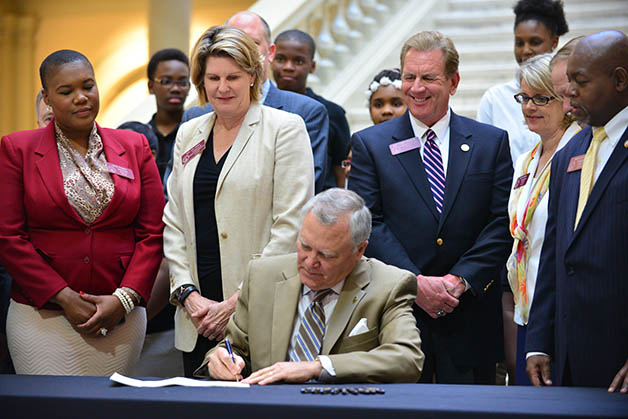In April last year, Governor Deal signed the Opportunity School District(OSD) legislation to bring forth a referendum this November allowing the state to assume management and operations of failing schools. 24 of the 141 failing schools in the state are in DeKalb.
Almost half of Atlanta Public Schools(APS) have been identified as failing and are on the OSD list. Last August APS hired Erin Hames, the architect of Deal’s Opportunity School District, to advise the district on how to avoid losing schools to the OSD. Since then APS has decided to close, consolidate and bring in charters to operate many of the failing schools.
Last October, DeKalb’s superintendent presented his plan to address failing schools. The plan consists of professional learning, family engagement, wrap-around support and various other curriculum and organizational enhancements.
DeKalb’s Superintendent sent this op-ed out with the message, “Taking the OSD target off our back begins and ends with improving classroom instruction and outcomes.”
Op-Ed on Opportunity School District

Dr. Stephen Green
Superintendent, DeKalb County School District
A Constitutional amendment on the November ballot, if passed, would create a statewide Opportunity School District (OSD). The OSD would allow state authorities to take control of schools they determine to be underperforming.
They’ve targeted 24 educational institutions in the DeKalb County School District – schools deemed “failing” by the state, based on standardized testing.
Many of us here in the DeKalb District believe that standardized tests may not fairly take into account … or accurately measure … the extreme complexity of education and learning in a district like ours, with 135 schools and 102,000 students from 180 nations and with 144 languages.
Whatever the measure, at this time 24 DeKalb schools wear the OSD target on their backs … as do 30 Atlanta Public Schools. In Atlanta’s system, the possibility of OSD take-over spurred a major overhaul and restructuring. We hope it brings the desired results for young people in that system.
“I think efforts like the Atlanta public school system is making will indicate that their schools should be shielded if they are making progress and if they’re trying to make progress,” Governor Nathan Deal told the Atlanta Journal-Constitution in an article on March 4, 2016.
In DeKalb, we’re making progress too. But we’ve chosen a different approach.
We believe the answer to boosting performance lies in a most obvious place – the classroom. We see no single, magic answer … just a laser focus on raising the quality of instruction and learning.
We’ve already gone through our own restructuring, a result of the devastating impact of the Great Recession. Until 2013, the DeKalb district operated at a deficit. At one point, authorities placed us on probation, one step before losing accreditation.
Today, after much work, we have finances under control with fiscal integrity … and we can even point to a modest budget surplus. We have a solid plan and a commitment, though our system remains at a crucial stage of recovery, needing resources for aging classrooms, teacher pay, safety, and support services.
Why have we chosen our ‘best-of-class classrooms’ approach instead of closing schools and combining classrooms?
Our approach validates and affirms our confidence in our greatest educational asset – our DeKalb teachers and administrators. We strongly believe their abilities and talents will be what it takes to bring students to achievement levels that rip away the OSD target … and its stigma.
Our approach involves an inside-out … not outside-in … examination and action plan. The DNA of effective instruction begins inside the classroom. It takes rigor, relevance, and relationships … with relationships most important.
We’re counting on classroom relationships … and investing heavily in them … to turn around academic metrics. No outside agency, governmental or otherwise, can provide the care, nurturing, and emotional support needed to inspire our students to higher achievements. Only student relationships with superb teachers and principals can do that.
We see these relationships, this foundation, already firmly established in our most challenged schools.
We now will build on that foundation. To support our students and our strategy, we’ve taken a number of steps, and we’ve already seen quantifiable progress.
First, we partnered with the Georgia Department of Education and the Metropolitan Regional Educational Service Agency to help our system create leaders of teaching and learning. Our joint focus on making curriculum, instruction, assessment, and accountability the top priorities in DCSD can surely be considered a successful start for the improvements we need.
We created a tiered system to support principals in addressing critical issues that may arise in their schools. We support teachers and administrators in those schools with a strong, data-driven dashboard system that monitors student progress and performance. Think of it as a
‘scholastic stethoscope,’ closely examining every vital sign needed for growth and progress in student outcomes.
Progress? Absolutely.
Since 2013, we’ve seen a 103-point increase in SAT scores. We’ve made a return to full accreditation too, and we’ve given across-the-board teacher and principal pay raises so that the talent in front of classrooms stays competitive with that in other metro Atlanta districts.
Since 2013, we’ve seen an 11-point increase in graduation rates. From 2014 to 2015 alone, we increased the high-school graduation rate from 62.6% to 70.9% – a strong one-year showing by any measure.
We shifted resources to support the 24 schools most challenged with academic achievement (and others), and we focused efforts on improving classroom attendance. We want to make sure that students get the full academic and social benefits of the classroom each day.
We can show progress in these and other ways. We also see challenges, however, that threaten the long-term success of our efforts.
First, we must retain qualified and effective teachers. To build the best schools, we need the best teachers. Our pay and incentive raises will help, but keeping and attracting great teachers takes a combination of compensation, benefits, and the support of our communities.
So that’s a second challenge – continuing to build partnerships among school leaders, teachers, students, and parents. Great education starts with engagement. Aligning the full energy and expectations of all the individuals who play roles in the education of a child gives us our best shot at creating a whole citizen for tomorrow.
Finally, we must maintain high expectations for student engagement and learning. There’s no substitute in education for holding kids accountable. And there’s nothing in education more valuable than learning that one reaches lofty goals through hard work.
We’re confident that our energetic and focused efforts to get schools off the “failing” list will be successful. Our own ambitious goals say it best:
• In 2016, the number of schools qualified as OSD-eligible will decrease … to zero.
• All targeted schools will meet state standards.
• Targeted high schools will have a graduation rate at or above the rest of the state.
Taking the OSD target off our back begins and ends with improving classroom instruction and outcomes.
Based on the progress our students are showing – their scholastic results, their engagement in our schools, and their growth as responsible and accountable individuals – we strongly believe that our “schools should be shielded,” in the words of Governor Deal, from OSD take-over.
We have taken a strong step in the right direction. Our progress will continue.










 “Extremism in defense of liberty is no vice. Moderation in pursuit of justice is no virtue.”
“Extremism in defense of liberty is no vice. Moderation in pursuit of justice is no virtue.”